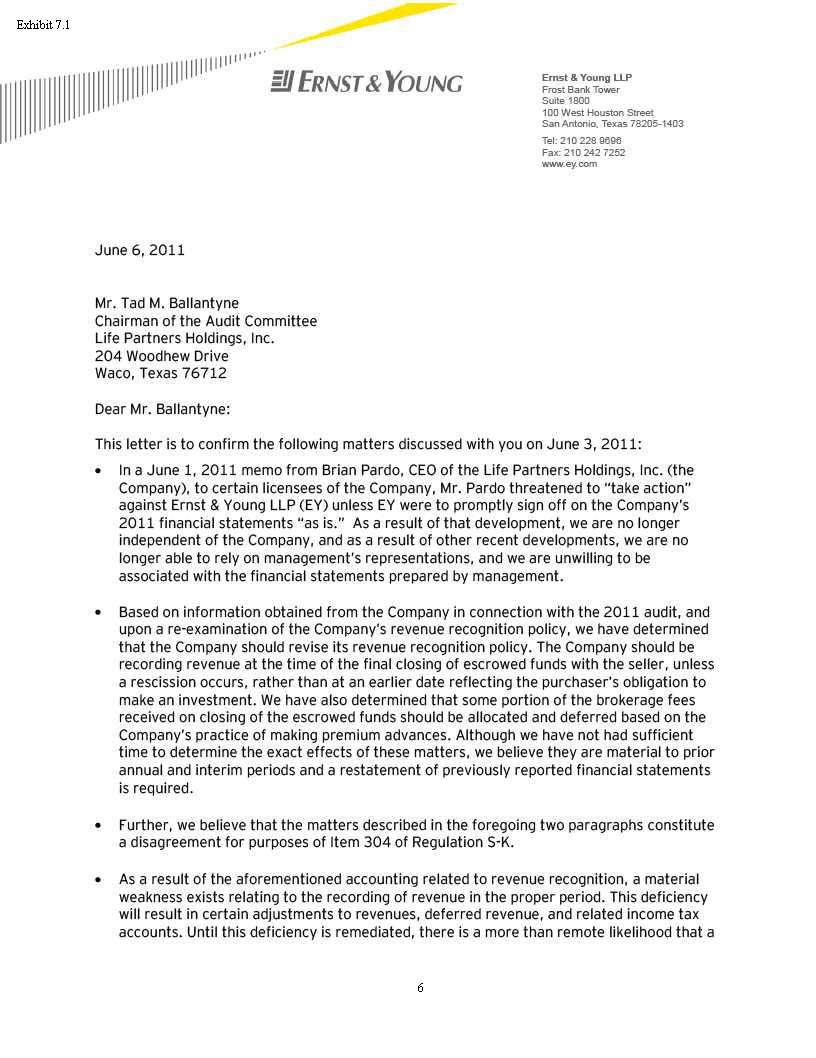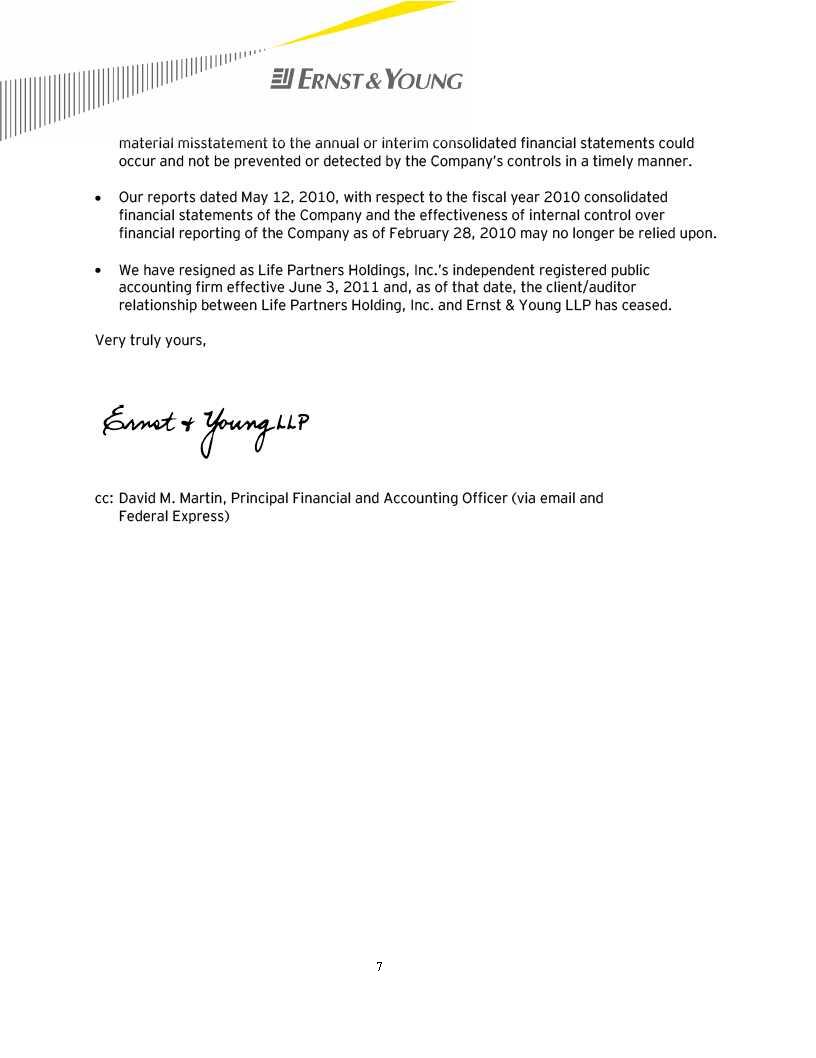Here is an interesting battle between an audit firm and an audit client. I’m pleased to see an audit firm stand up for its independence.
Good for Ernst and Young!
The is from the 8-K form and the exhibits.
UNITED STATES
SECURITIES AND EXCHANGE COMMISSION
WASHINGTON, DC 20549
FORM 8-K
CURRENT REPORT PURSUANT
TO SECTION 13 OR 15(D) OF THE
SECURITIES EXCHANGE ACT OF 1934
Date of report (date of earliest event reported): June 6, 2011
LIFE PARTNERS HOLDINGS, INC.
(Exact Name of Registrant as Specified in Its Charter)
Texas
(State of incorporation)
|
0-7900
(Commission File Number)
|
74-2962475
(I.R.S. Employer ID no.)
|
|
204 Woodhew
Waco, Texas
(Address of Principal Executive Offices)
|
76712
(Zip Code)
|
Issuer’s telephone number, including area code: 254-751-7797
Check the appropriate box below if the Form 8-K filing is intended to simultaneously satisfy the filing obligation of the registrant under any of the following provisions (see General Instruction A.2. below):
|
|
o
|
Written communications pursuant to Rule 425 under the Securities Act (17 CFR 230.425)
|
|
|
o
|
Soliciting material pursuant to Rule 14a-12 under the Exchange Act (17 CFR 240.14a-12)
|
|
|
o
|
Pre-commencement communications pursuant to Rule 14d-2(b) under the Exchange Act (17 CFR 240.14d-2(b))
|
o Pre-commencement communications pursuant to Rule 13e-4(c) under the Exchange Act (17 CFR 240.13e-4(c))
Item 4.01. Changes in Registrant’s Certifying Accountant
On June 6, 2011, Life Partners Holdings, Inc. (“we” or “Life Partners”) received a letter from Ernst & Young LLP (“Ernst & Young”) addressed to the Chairman of our Audit Committee (the “Resignation Letter”) confirming that it had resigned effective June 3, 2011, as our independent registered public accounting firm, as had been orally communicated to the Chairman of the Audit Committee on June 3, 2011. The resignation means that Ernst & Young will not certify our financial statements for the fiscal year ended February 28, 2011 (“Fiscal 2011”), which is necessary for completing and filing our Annual Report on Form 10-K for Fiscal 2011 (the “2011 Annual Report”).
The resignation follows a letter from Mr. Brian Pardo, our Chairman and CEO, to our licensee network (persons who refer purchasers to us) commenting upon the delayed filing of our 2011 Annual Report. The letter stated that it was Mr. Pardo’s position that we would “take action” against Ernst & Young if it did not promptly complete its audit and sign off on our financial statements without adjustment. Our Audit Committee wrote to Ernst & Young disclaiming the letter’s statements and asserting that the letter did not speak for the Audit Committee. Notwithstanding the Audit Committee’s disclaimer, Ernst & Young stated that the letter compromised its independence, and when considered with other recent developments, that it was no longer able to rely upon management’s representations, and that it was unwilling to be associated with the financial statements prepared by management.
In its Resignation Letter, Ernst & Young further stated that after a re-examination of our revenue recognition policy, it had concluded that we should revise the policy. Our existing policy recognizes income at the time a settlement has been closed (that is, an agreement has been reached with the settlor and the purchaser has obligated itself to make the purchase). Ernst & Young believes that revenues should be recognized no earlier than the final closing of escrowed funds with the settlor. Ernst & Young also stated that some portion of our fee revenue should be allocated and deferred based the Company’s practice of making premium advances. It further concluded that the use of our current accounting policies and practices with respect to these matters results in a more than remote likelihood that a material misstatement in our annual and interim financial statements could occur and not be prevented or detected by our internal controls (which are based on existing policies).
The revenue recognition matter constitutes a disagreement as defined under Item 304(a)(1)(iv) of Regulation S-K, as promulgated by the Securities and Exchange Commission (the “SEC”). Ernst & Young discussed the subject matter of the disagreement with our Audit Committee and our Chief Financial Officer. We have authorized Ernst & Young to respond fully to any successor independent registered public accounting firm that the Audit Committee appoints.
We engaged Ernst & Young as our independent registered public accounting firm on March 2, 2010, and it had expressed an unqualified opinion on our Fiscal 2010 financial statements. Ernst & Young followed Eide Bailly LLP (“Eide Bailly”), which had been our independent registered public accounting firm, which audited our Fiscal 2009 financial statements, and which expressed an unqualified opinion on such statements. Except as described above, during the two most recent fiscal years and interim period preceding Ernst & Young’sresignation, there were no other disagreements with either Ernst & Young or Eide Bailly as defined under Item 304(a)(1)(iv) of Regulation S-K and no other reportable events with either firm as defined under Item 304(a)(1)(v) of Regulation S-K. While not a reportable event, our report on internal controls and Eide Bailly’s opinion on internal controls include information related to material weaknesses in our internal controls, which were included in our Form 10-K for the year ended February 28, 2009. The material weakness was unrelated to the matters cited as disagreements by Ernst & Young.
We provided Ernst & Young with a copy of this Current Report on Form 8-K and asked that Ernst & Young furnish us with a letter addressed to the SEC stating whether it agrees with the above statements. The Resignation Letter is attached as Exhibit 7.1. Ernst & Young’s letter dated June 9, 2011, addressed to the SEC is attached as Exhibit 16.1.


